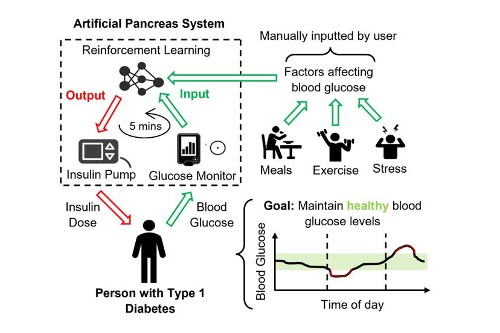
[ad_1]

Synthetic Pancreas System with Reinforcement Studying. Picture credit score: Harry Emerson
Scientists on the College of Bristol have proven that reinforcement studying, a sort of machine studying wherein a pc program learns to make choices by attempting completely different actions, considerably outperforms industrial blood glucose controllers by way of security and effectiveness. Through the use of offline reinforcement studying, the place the algorithm learns from affected person data, the researchers enhance on prior work, exhibiting that good blood glucose management will be achieved by studying from the selections of the affected person relatively than by trial and error.
Sort 1 diabetes is likely one of the most prevalent auto-immune circumstances within the UK and is characterised by an insufficiency of the hormone insulin, which is answerable for blood glucose regulation.
Many components have an effect on an individual’s blood glucose and subsequently it may be a difficult and burdensome job to pick the right insulin dose for a given state of affairs. Present synthetic pancreas gadgets present automated insulin dosing however are restricted by their simplistic decision-making algorithms.
Nevertheless a brand new examine, revealed within the Journal of Biomedical Informatics, reveals offline reinforcement studying might characterize an vital milestone of look after folks dwelling with the situation. The biggest enchancment was in youngsters, who skilled an extra one-and-a-half hours within the goal glucose vary per day.
Kids characterize a very vital group as they’re usually unable to handle their diabetes with out help and an enchancment of this dimension would lead to markedly higher long-term well being outcomes.
Lead creator Harry Emerson from Bristol’s Division of Engineering Arithmetic, defined: “My analysis explores whether or not reinforcement studying may very well be used to develop safer and simpler insulin dosing methods.
“These machine studying pushed algorithms have demonstrated superhuman efficiency in taking part in chess and piloting self-driving automobiles, and subsequently might feasibly be taught to carry out extremely personalised insulin dosing from pre-collected blood glucose knowledge.
“This explicit piece of labor focuses particularly on offline reinforcement studying, wherein the algorithm learns to behave by observing examples of excellent and unhealthy blood glucose management.
“Prior reinforcement studying strategies on this space predominantly utilise a means of trial-and-error to determine good actions, which might expose a real-world affected person to unsafe insulin doses.”
Because of the excessive threat related to incorrect insulin dosing, experiments have been carried out utilizing the FDA-approved UVA/Padova simulator, which creates a set of digital sufferers to check kind 1 diabetes management algorithms. State-of-the-art offline reinforcement studying algorithms have been evaluated towards one of the broadly used synthetic pancreas management algorithms. This comparability was performed throughout 30 digital sufferers (adults, adolescents and kids) and thought of 7,000 days of knowledge, with efficiency being evaluated in accordance with present scientific pointers. The simulator was additionally prolonged to think about sensible implementation challenges, reminiscent of measurement errors, incorrect affected person info and restricted portions of obtainable knowledge.
This work supplies a foundation for continued reinforcement studying analysis in glucose management; demonstrating the potential of the strategy to enhance the well being outcomes of individuals with kind 1 diabetes, whereas highlighting the tactic’s shortcomings and areas of crucial future growth.
The researchers’ final objective is to deploy reinforcement studying in real-world synthetic pancreas techniques. These gadgets function with restricted affected person oversight and consequently would require vital proof of security and effectiveness to attain regulatory approval.
Harry added: ”This analysis demonstrates machine studying’s potential to be taught efficient insulin dosing methods from the pre-collected kind 1 diabetes knowledge. The explored methodology outperforms one of the broadly used industrial synthetic pancreas algorithms and demonstrates a capability to leverage an individual’s habits and schedule to reply extra shortly to harmful occasions.”

College of Bristol
is likely one of the hottest and profitable universities within the UK.
[ad_2]